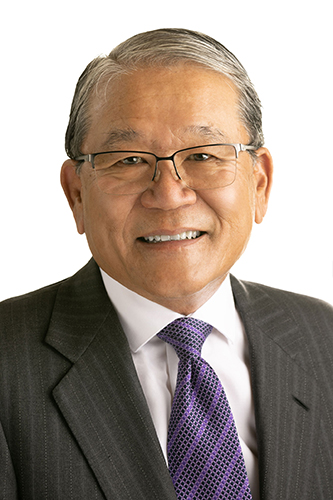Bill Fujioka’s (Crown ’74, sociology) life in civil service is a storied one.
His public service career can be traced back to the 1970s when he worked as a custodian and gardener while pursuing his degree from UC Santa Cruz. Now, over five decades later, Fujioka’s career includes work as Los Angeles’s City Administrative Officer, the first-ever Chief Executive Officer of the city, and his current role as the Chair of the Los Angeles Japanese American National Museum (JANM).
Fujioka came out of retirement to join the Board of Trustees for JANM and eventually was selected to be the Board Chair. For him, the decision to join the JANM Board was an unsurprising one.
"I strongly feel it’s my generation’s responsibility to not only preserve our history, but to retell that history to ensure what happened to my community in 1942, never happens again to any other vulnerable community. I'm going to be outspoken, because in some communities, there’s a tendency to pull back a little bit," Fujioka says. "I've never been that way. I wouldn't have gotten to my last two positions in government by being the shy retiring type."
Fujioka succeeds Secretary Norman Mineta as chair of the Japanese American National Museum. Mineta’s legacy for the civil liberties of Japanese Americans is incomparable, and Fujioka finds inspiration and motivation for his work as Chair of JANM in his succession of Mineta.
The Japanese American National Museum was established in 1992 and is dedicated to preserving the history and culture of Japanese Americans. It also serves as a monument of the wrongful persecution of Japanese Americans nationwide. The courtyard of the museum was the location where Japanese Americans were forced onto buses and taken away to assembly centers and internment camps across the country. Fujioka’s family were forced onto buses at this site. For Fujioka, the site of this horrible act can serve both as a platform for future change and to honor the great accomplishments of his predecessor.
JANM plans to rename the courtyard as the Norm Mineta Plaza for Democracy.
"I'm hoping that the Japanese American National Museum becomes a place where people convene, because when I see the plaza, I see a town square, where people can come together and just talk," Fujioka says. "I also see the National Center for Preservation Democracy, a place where people with diverse feelings and on a multitude of issues could come together, and sit down and talk about democracy, because we're losing it now. A place for the community to have a safe place where they can come together."
From Los Angeles to Santa Cruz, and back again
When Fujioka set out on his collegiate journey, his decision to make a move far from the busy streets of Southern California to the forests of UC Santa Cruz was entirely intentional.
Fujioka recounts his youth in LA among street gangs, and how his father urged Fujioka to leave town to pursue his education. This was a hard choice for Fujioka, but once he immersed himself in UCSC’s academics and campus, he quickly grew to appreciate his future alma mater.
"The first year or two was difficult for me, but my last two years, I loved it," says Fujioka. "I loved the environment, I loved academic freedom. This one professor, the Dean of the School of Sociology, Dennis McElrath; I don't think he knows to this day what kind of impression he made on me: I took several classes with him, and he lit a fire."
Having his passion for public service sparked at UCSC, Fujioka hopes to encourage and enlighten students working towards his same path to the impact that their work can create.
"You’re always going to hear me say that I want to shout the benefits of public service, because you can impact lives. when it's all said and done, that's what it's all about: You can make someone else's life better."
Above all, Fujioka credits UC Santa Cruz with giving him a bedrock to launch his career into local government and public service upon his return to Los Angeles. Coming from Los Angeles as a self-described average student, Fujioka looks back at his time spent learning at UCSC as fundamental to his future at one of the highest levels of public service. He ended up graduating earning a degree with honors in sociology. Several years ago, he was recognized as one of the top 45 graduates from UCSC.
"I was an average student when I got accepted there. I was happy to go to Santa Cruz, it was brand new, and then I went on to have a great public service career. But most importantly, I think because of growing up in the 70s at UC Santa Cruz, it taught us about respecting others. It laid that foundation. I truly loved my time and experience at UCSC."



